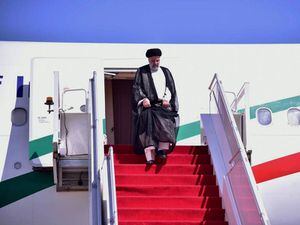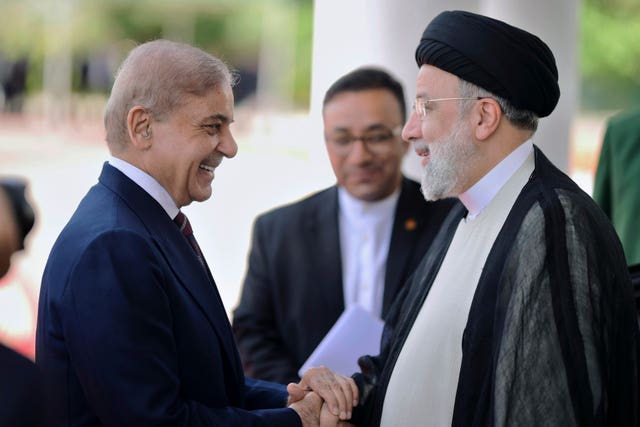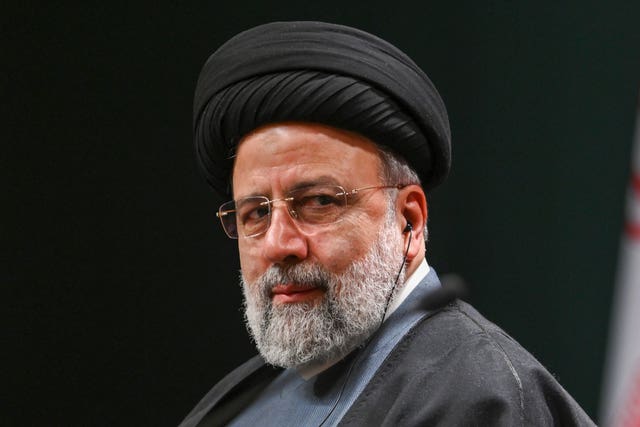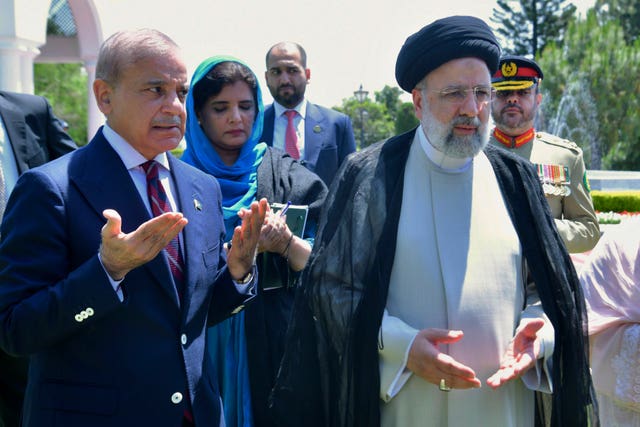Iranian and Pakistani leaders vow to boost trade
Ebrahim Raisi and Pakistani Prime Minister Shehbaz Sharifin spoke to reporters as the Iranian President began a three-day visit.

Iranian and Pakistani leaders have vowed to strengthen economic and security co-operation, as the two countries seek to smooth over a diplomatic rift.
Their meeting was part of efforts by Islamabad and Tehran to mend ties which had been briefly strained in January when each carried out strikes in other’s territory, targeting militants accused of attacking their own security forces.
Iran’s President Ebrahim Raisi and Pakistani Prime Minister Shehbaz Sharif spoke to reporters after meeting at Mr Sharif’s office, hours after Mr Raisi arrived in Islamabad for a three-day visit.

Pakistan has witnessed a surge in militant violence in recent months, mostly blamed on the Pakistani Taliban and insurgents targeting security forces in Pakistan and neighbouring Iran.
Mr Sharif welcomed Mr Raisi with an honour guard ceremony in front of the premier’s office. According to a statement released by the premier’s office, the two leaders discussed a range of bilateral issues and vowed to co-operate to fight terrorism, as well as jointly reiterating condemnations of Israel’s war in Gaza.
The Pakistani leader praised Iran’s “strong stand on the issue of Palestine” and said: “Pakistan is also with the Palestinians.”
In his televised remarks, Mr Raisi said that the killings by Israel in Gaza were being committed with the support of the United States and other Western countries.

Mr Raisi also vowed to boost what he called “unacceptably” meagre bilateral trade and called for setting up more border markers. Pakistan and Iran set up the first such border market in south-western Pakistan’s Baluchistan province last year, promising to set up five more such markets under a 2012 agreement.
The two leaders also signed eight co-operation agreements, according to Mr Sharif’s office.
Authorities said the two sides also discussed the multibillion-dollar gas pipeline project, on hold since 2014. The project – opposed by Washington for what it says is a violation of sanctions imposed on Tehran over its nuclear programme – launched in 2013 to supply Iranian natural gas to energy-starved Pakistan.
Iran says it has already completed the pipeline on its side of the border after investing two billion dollars (£1.6 billion). Pakistan was supposed to finish construction on its territory by the end of 2014, but work stalled, leading to tensions between the two nations.
The Iranian president later met with his Pakistani counterpart Asil Ali Zardari, who helped launch the pipeline project after traveling to Iran in 2013.

Mr Raisi is accompanied by his spouse and a high-level delegation. He plans to visit Karachi, the country’s biggest city, and Lahore, where he will meet with the country’s recently elected first female chief minister Maryam Nawaz Sharif.
The visit comes after Iran’s air strike into Israel, which was in response to an Israeli strike in Syria that had killed two Iranian generals in a consular building.
Pakistan is among the countries that has no diplomatic relations with Israel because of the issue of Palestinian statehood.





